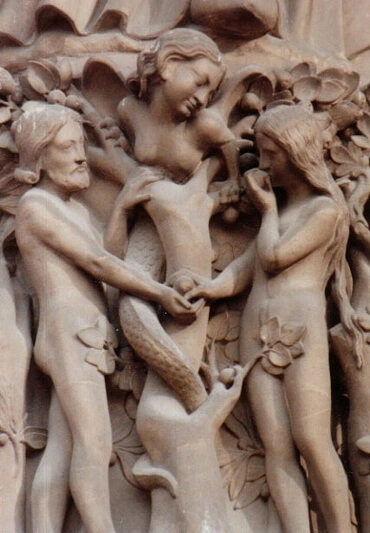创世纪3:6的解释
By Brian David (machine translated into 中文)

感受到生命是他们自己的(由女人代表),最古老教会的人感到有一种压倒性的欲望,从自己身上思考上帝的本质("善 "和 "食物 "都与欲望有关,或善或恶),并以扭曲的逻辑支持这种欲望("愉快 "和 "眼睛 "都与智慧有关,或善或恶)。除此之外,成为 "聪明人 "的想法,可能知道上帝所知道的,使他们充满了快乐(这是 "想要的")。所以他们 "吃了果子";他们开始探索神性的本质,以期自己拥有神圣的知识。
但是有犹豫。他们仍然知道他们被命令的是什么,他们头脑中的理性部分(由 "人 "代表,这里用的是阳性的意思)必须被拉进来。但他们还是吃了;"人 "也吃了那果子。
Arcana Coelestia #1077
1077. The reason the people who are here called 'Ham' and 'Canaan', that is, who separate faith from charity and who in so doing focus worship solely on external things, cannot know what conscience is and where it originates, must be discussed briefly. Conscience is formed by means of the truths of faith, for what a person has heard, acknowledged, and believed constitutes conscience with him. After that, acting contrary to those things is for him acting contrary to conscience, as may become quite clear to anyone. Consequently unless it is the truths of faith that he hears, acknowledges, and believes, he cannot possibly have a true conscience. For it is by means of the truths of faith, with the Lord working within charity, that a person is regenerated, and so by means of them receives conscience. Conscience is also the new person himself. From this it is clear that truths of faith are the means by which this is achieved, that is, by which a person lives according to the things faith teaches, its fundamental teaching being to love the Lord above all things and the neighbour as oneself. If he does not live according to those truths, what is faith but something hollow, and an audible sound, or something separated from heavenly life, in which, once separated, there is nothing saving? For to believe that a person can still be saved no matter how he lives, provided he has faith, is to say that he is saved even though he has no charity and even though he has no conscience. It amounts to saying that, provided he has faith, even though he does not have it until the last hour of life, he can be saved, despite spending his time hating, getting revenge, plundering, and committing adultery, in short, doing everything contrary to charity and conscience. Let such people, when governed by an assumption as false as this, ponder what truth of faith exists that can form their conscience. Will it not be that which is false? If they imagine that they have any conscience at all, it amounts to no more than external restraints - fear of the law, of loss of position, wealth, and reputation on account of these, which fears constitute with them what they call conscience, a conscience which says that they should do no harm to the neighbour but behave well towards him. Since however this is not conscience, because it is not charity, such persons consequently rush into the most wicked and disgusting actions as soon as those restraints have been loosed or done away with. But the situation is altogether different with people who, though asserting that faith alone saves, have nevertheless led charitable lives; for their faith has had charity from the Lord within it.






